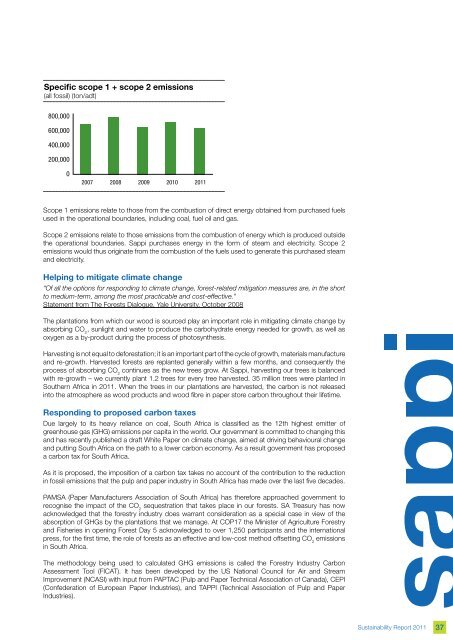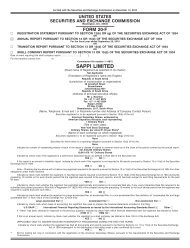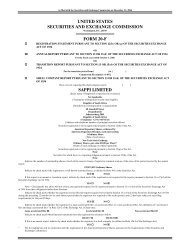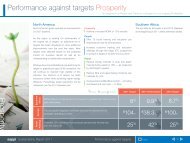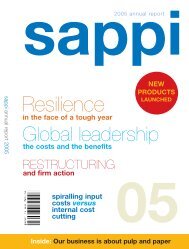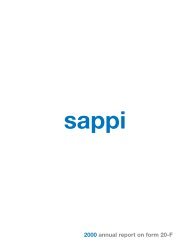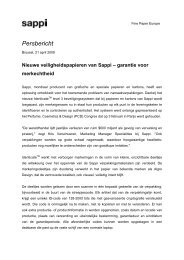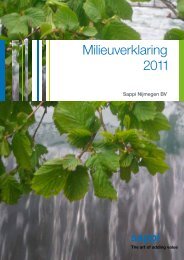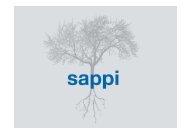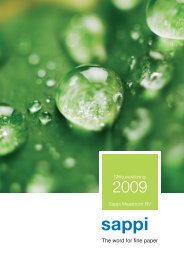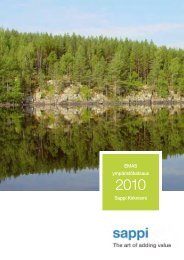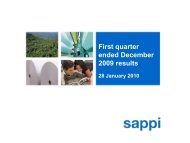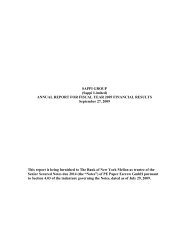Southern Africa - Sappi
Southern Africa - Sappi
Southern Africa - Sappi
You also want an ePaper? Increase the reach of your titles
YUMPU automatically turns print PDFs into web optimized ePapers that Google loves.
Specific scope 1 + scope 2 emissions<br />
(all fossil) (ton/adt)<br />
800,000<br />
600,000<br />
400,000<br />
200,000<br />
0<br />
2007 2008 2009 2010 2011<br />
Scope 1 emissions relate to those from the combustion of direct energy obtained from purchased fuels<br />
used in the operational boundaries, including coal, fuel oil and gas.<br />
Scope 2 emissions relate to those emissions from the combustion of energy which is produced outside<br />
the operational boundaries. <strong>Sappi</strong> purchases energy in the form of steam and electricity. Scope 2<br />
emissions would thus originate from the combustion of the fuels used to generate this purchased steam<br />
and electricity.<br />
Helping to mitigate climate change<br />
“Of all the options for responding to climate change, forest-related mitigation measures are, in the short<br />
to medium-term, among the most practicable and cost-effective.”<br />
Statement from The Forests Dialogue, Yale University, October 2008<br />
The plantations from which our wood is sourced play an important role in mitigating climate change by<br />
absorbing CO 2 , sunlight and water to produce the carbohydrate energy needed for growth, as well as<br />
oxygen as a by-product during the process of photosynthesis.<br />
Harvesting is not equal to deforestation; it is an important part of the cycle of growth, materials manufacture<br />
and re-growth. Harvested forests are replanted generally within a few months, and consequently the<br />
process of absorbing CO 2 continues as the new trees grow. At <strong>Sappi</strong>, harvesting our trees is balanced<br />
with re-growth – we currently plant 1.2 trees for every tree harvested. 35 million trees were planted in<br />
<strong>Southern</strong> <strong>Africa</strong> in 2011. When the trees in our plantations are harvested, the carbon is not released<br />
into the atmosphere as wood products and wood fibre in paper store carbon throughout their lifetime.<br />
Responding to proposed carbon taxes<br />
Due largely to its heavy reliance on coal, South <strong>Africa</strong> is classified as the 12th highest emitter of<br />
greenhouse gas (GHG) emissions per capita in the world. Our government is committed to changing this<br />
and has recently published a draft White Paper on climate change, aimed at driving behavioural change<br />
and putting South <strong>Africa</strong> on the path to a lower carbon economy. As a result government has proposed<br />
a carbon tax for South <strong>Africa</strong>.<br />
As it is proposed, the imposition of a carbon tax takes no account of the contribution to the reduction<br />
in fossil emissions that the pulp and paper industry in South <strong>Africa</strong> has made over the last five decades.<br />
PAMSA (Paper Manufacturers Association of South <strong>Africa</strong>) has therefore approached government to<br />
recognise the impact of the CO 2 sequestration that takes place in our forests. SA Treasury has now<br />
acknowledged that the forestry industry does warrant consideration as a special case in view of the<br />
absorption of GHGs by the plantations that we manage. At COP17 the Minister of Agriculture Forestry<br />
and Fisheries in opening Forest Day 5 acknowledged to over 1,250 participants and the international<br />
press, for the first time, the role of forests as an effective and low-cost method offsetting CO 2 emissions<br />
in South <strong>Africa</strong>.<br />
The methodology being used to calculated GHG emissions is called the Forestry Industry Carbon<br />
Assessment Tool (FICAT). It has been developed by the US National Council for Air and Stream<br />
Improvement (NCASI) with input from PAPTAC (Pulp and Paper Technical Association of Canada), CEPI<br />
(Confederation of European Paper Industries), and TAPPI (Technical Association of Pulp and Paper<br />
Industries).<br />
Sustainability Report 2011 37


